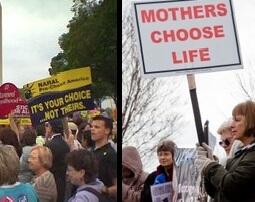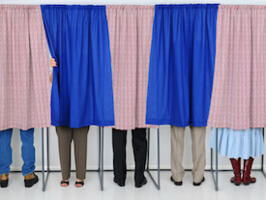Voters See ‘War on Women’ As Politics, Not Reality
Most voters don’t consider the so-called “war on women” a war at all but see it as just a political tactic. But women are less convinced than men that they share the same political interests.
A new Rasmussen Reports national telephone survey finds that just 22% of Likely U.S. Voters believe there is really a political “war on women” going on. Fifty-nine percent (59%) say the “war on women” is primarily a slogan used for political purposes instead. But 19% are not sure. (To see survey question wording, click here.)
Sixty-five percent (65%) of men say it’s political sloganeering, but only 52% of women agree. Women aren’t much more likely than men to think there is a political war on women, but one-in-four female voters (24%) are undecided.
“War on women” is a phrase Democrats use to criticize certain Republican policies that they contend limit women’s rights in areas such as birth control, abortion and workplace discrimination.
Fifty-four percent (54%) of men think, generally speaking, that women and men have mostly the same political interests. Only 27% believe the sexes mostly have completely separate political agendas. Among women, however, the gap is narrower: 45% say women and men have mostly the same political interests, but 38% think they have mostly separate political agendas.
What is the chief political concern for most women voters? Thirty-six percent (36%) of women voters say it’s the economy, with social issues such as same-sex marriage and abortion a distant second with 18% support. Fourteen percent (14%) list domestic issues like Social Security and health care as their chief concern, followed by national security (13%), fiscal issues such as taxes and government spending (9%) and two percent (2%) who say it is something else.
Men agree on the order of importance that women attach to the major issues, but they tend to see the level of concern for the economy and for social issues as almost even.
Fifty-three percent (53%) of women voters say their political views are most like Hillary Clinton’s rather than Sarah Palin’s. Twenty-nine percent (29%) say their views are most like Palin’s. Eighteen percent (18%) are not sure. Among men, 46% say Clinton, 39% say Palin, with 15% undecided.
Among voters under 40, 62% say their political views are most like Clinton’s. Just 19% say they are most like Palin’s. Among voters 40 and older, however, it’s a near tie between Clinton and Palin.
(Want a free daily e-mail update? If it's in the news, it's in our polls). Rasmussen Reports updates are also available on Facebook.
The survey of 1,000 Likely Voters was conducted on September 13-14, 2014 by Rasmussen Reports. The margin of sampling error is +/- 3 percentage points with a 95% level of confidence. Field work for all Rasmussen Reports surveys is conducted by Pulse Opinion Research, LLC. See methodology.
Voters strongly believe the United States is a more divided nation these days, and they think both sides are to blame.
Fifty-eight percent (58%) of voters say they have been following recent news reports about the “war on women,” with 30% who have been following Very Closely. There’s no difference between the sexes when it comes to the level of attention they are giving to the topic.
Thirty-eight percent (38%) of Democrats believe there is a political war on women, and only 42% disagree, with 20% undecided. Seventy-five percent (75%) of Republicans and 61% of voters not affiliated with either major party say the war on women is primarily a slogan used for political purposes.
Younger voters are no more convinced than their elders that there is really a war on women, but they are less likely to write if off as political sloganeering.
Most middle-aged voters are more likely to agree that both sexes share the same political interests than older or younger voters
Voters under 40 rate the economy and social issues as equal concerns, while older voters put emphasis on the economy.
Forty-nine percent (49%) of all women now say they are pro-choice, while 40% are pro-life.
Voters by a 49% to 39% margin agree with the recent U.S. Supreme Court ruling in the Hobby Lobby case that business owners should be able to opt out of the new health care law’s requirement that they provide health insurance with free contraception if it violates their religious beliefs.
Fifty-three percent (53%) of voters believe the U.S. economy is fair to women, but 42% disagree. Women agree but by a narrower 49% to 45% margin.
Ninety percent (90%) of voters believe those in countries with democratically elected governments have a responsibility to be informed about major policy issues, but just nine percent (9%) think most Americans are informed voters.
Additional information from this survey and a full demographic breakdown are available to Platinum Members only.
Please sign up for the Rasmussen Reports daily e-mail update (it's free) or follow us on Twitter or Facebook. Let us keep you up to date with the latest public opinion news.
The survey of 1,000 Likely Voters was conducted on September 13-14, 2014 by Rasmussen Reports. The margin of sampling error is +/- 3 percentage points with a 95% level of confidence. Field work for all Rasmussen Reports surveys is conducted by Pulse Opinion Research, LLC. See methodology.
Rasmussen Reports is a media company specializing in the collection, publication and distribution of public opinion information.
We conduct public opinion polls on a variety of topics to inform our audience on events in the news and other topics of interest. To ensure editorial control and independence, we pay for the polls ourselves and generate revenue through the sale of subscriptions, sponsorships, and advertising. Nightly polling on politics, business and lifestyle topics provides the content to update the Rasmussen Reports web site many times each day. If it's in the news, it's in our polls. Additionally, the data drives a daily update newsletter and various media outlets across the country.
Some information, including the Rasmussen Reports daily Presidential Tracking Poll and commentaries are available for free to the general public. Subscriptions are available for $4.95 a month or 34.95 a year that provide subscribers with exclusive access to more than 20 stories per week on upcoming elections, consumer confidence, and issues that affect us all. For those who are really into the numbers, Platinum Members can review demographic crosstabs and a full history of our data.
To learn more about our methodology, click here.





